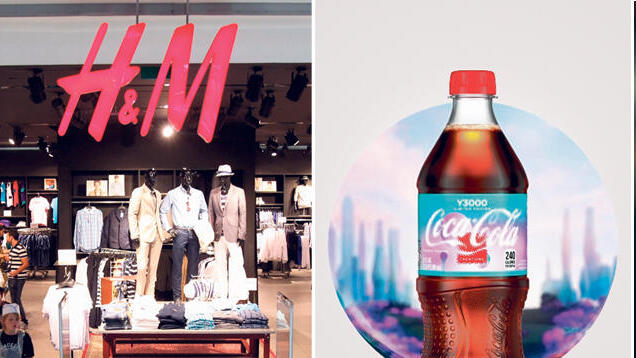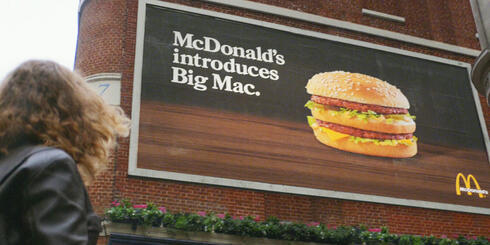
AI washing: From Coca-Cola to H&M, giant corporations are exploiting the AI wave
Large corporations are increasingly incorporating AI into campaigns designed to present them as "innovative" and divert public attention from the health and environmental harms of their products
You’ve heard of greenwashing and pinkwashing, and now there is “AI washing.” This term is used by companies that claim their products are based on AI, even when they aren’t, usually in an attempt to attract customers or investors who may not scrutinize terms like "machine learning," "generative AI," or "neural network" closely and fail to notice that behind buzzwords like these, there is often little substance.
However, AI washing is also employed by giant corporations that incorporate the concept of AI into their campaigns to portray themselves as innovative and divert attention away from the health and environmental damages caused by their products. Some examples include Coca-Cola, Pepsi, Zara, H&M, McDonald's, and Philip Morris.
Coca-Cola's beverages are among the most harmful products around, alongside cigarettes and petroleum. The company's flagship products are sugary, high-calorie drinks, consumption of which has been linked to health issues like diabetes and high blood pressure. Now, the company has introduced a new drink called "Coca-Cola Y3000," claiming that it was created using artificial intelligence and provides a glimpse of the "an optimistic vision of what’s to come." The company said, "For the first time, Coca-Cola Y3000 was co-created with artificial intelligence to help bring the flavor of tomorrow to Coke fans."
There's also a QR code that can be scanned to access the Coca-Cola app, where an "AI-based experience will provide fans with an unexpected and exciting perspective on what the year 3000 might look like." It's somewhat audacious to depict a rosy future a thousand years from now, especially when the climate crisis poses a threat to inhabiting this planet in just a 100 years.
Related articles:
While Coca-Cola's AI beverage is indeed a sugar-free sweetened drink, such artificially sweetened beverages are not without their own health risks. Research has found that even "diet" or "zero" beverages increase the risk of diabetes, as the brain responds to beverages with artificial sweeteners the same way that it does to real sugar. Frequent consumption of these beverages can increase one’s appetite for high-calorie foods, thus increasing the risk of weight gain and related health issues. A 2015 study found that people with excess weight who switched to consuming "diet" beverages consumed more calories than those who drank sugary beverages.
In addition to health concerns, a recent study found a possible link between the consumption of artificial sweeteners during pregnancy and an increased risk of autism in offspring. "The human body needs water alone and not another harmful beverage with deadly-tasting artificial ingredients," said Dr. Hagai Levine, head of Israel’s association of Public Health Physicians.
Additionally, Coca-Cola, which sells billions of plastic bottles every year, is one of the world's major polluters. Last year, the organization Break Free From Plastic named the company the world's top plastic polluter for the fifth consecutive year. The index, based on a catalog of plastic waste collected throughout the year by 200,000 volunteers in 87 countries, identified 31,000 plastic products from the company, twice the amount found in 2018 and more than the waste of the companies ranking second and third combined.
The company is also a major water consumer. According to estimates, producing one liter of Coca-Cola requires three liters of water, and each year the company's water consumption approaches 300 billion liters. In the past, the company has been accused of depleting local water sources, literally leaving communities dry and harming local agriculture in various parts of the world.
For example, in 1999, Coca-Cola set up a bottling plant in the village of Kaladera in the Indian state of Rajasthan, a region with a desert climate where farmers rely on aquifers to irrigate their crops. Since then, Coca-Cola's plant has caused a drastic decline in the water supply, exacerbating the water crisis. In light of the climate crisis, which disrupts water supplies in various parts of the world, continuing to produce a harmful product that requires significant water consumption is at best negligent.
From McDonald's to H&M
Coca-Cola is not the only company introducing the concept of artificial intelligence into its advertising campaigns. Pepsi, for example, told Axios last year that it had already invested hundreds of millions of dollars in AI systems to create new product lines and flavors, streamline the supply chain, analyze sales, and tailor product displays in stores. In other words, it is using AI to make its harmful products more appealing and ensure they are purchased in greater quantities.
Even McDonald's, responsible for the fast-food revolution that is a major driver of the obesity epidemic in the Western world, boasts of its use of AI. Its executives spoke in July at a VentureBeat conference about the deployment of AI-based automated ordering systems at drive-thru stations at the company's U.S. branches. Successful implementation of these systems could allow the company to reduce its workforce, many of whom come from economically vulnerable populations.
Fast fashion giant H&M, whose cheap and short-lived clothing model generates extensive environmental damage in the form of greenhouse gas emissions and increased water usage, announced a collaboration with Google last year. H&M utilized Google's cloud-based AI tools to create a "stronger customer experience" and streamline the supply chain. They added empty platitudes like "building a meaningful customer relationship" when in reality the company leverages AI to make us buy more clothes we don't really need, exacerbating the climate crisis.
Zara, which produces no less harmful clothing, already boasted in 2018 about collaborating with AI companies to improve its inventory management, monitor customer traffic in stores, and predict customer behavior.
Tobacco giant Philip Morris, whose harmful product requires no introduction, has also engaged in AI washing. In August, the company published an article touting AI's power to enable employees to thrive in their workplace by integrating human advantages with what it calls "machine strength." In 2019, it reported on AI's ability to halt the illicit trade of products between countries. Philip Morris didn't specify which products, but it's not hard to guess.
If there's one thing giant corporations excel at, it's identifying, utilizing and taking advantage of trends. Previously, these trends have included diversity, inclusivity, and LGBTQ+ issues. Now, AI has entered the picture, and all these corporations are rushing towards it, hoping that some of its success will rub off on them. By doing so, they distract us momentarily from the true cost we're paying for products that have remained essentially the same for decades.

